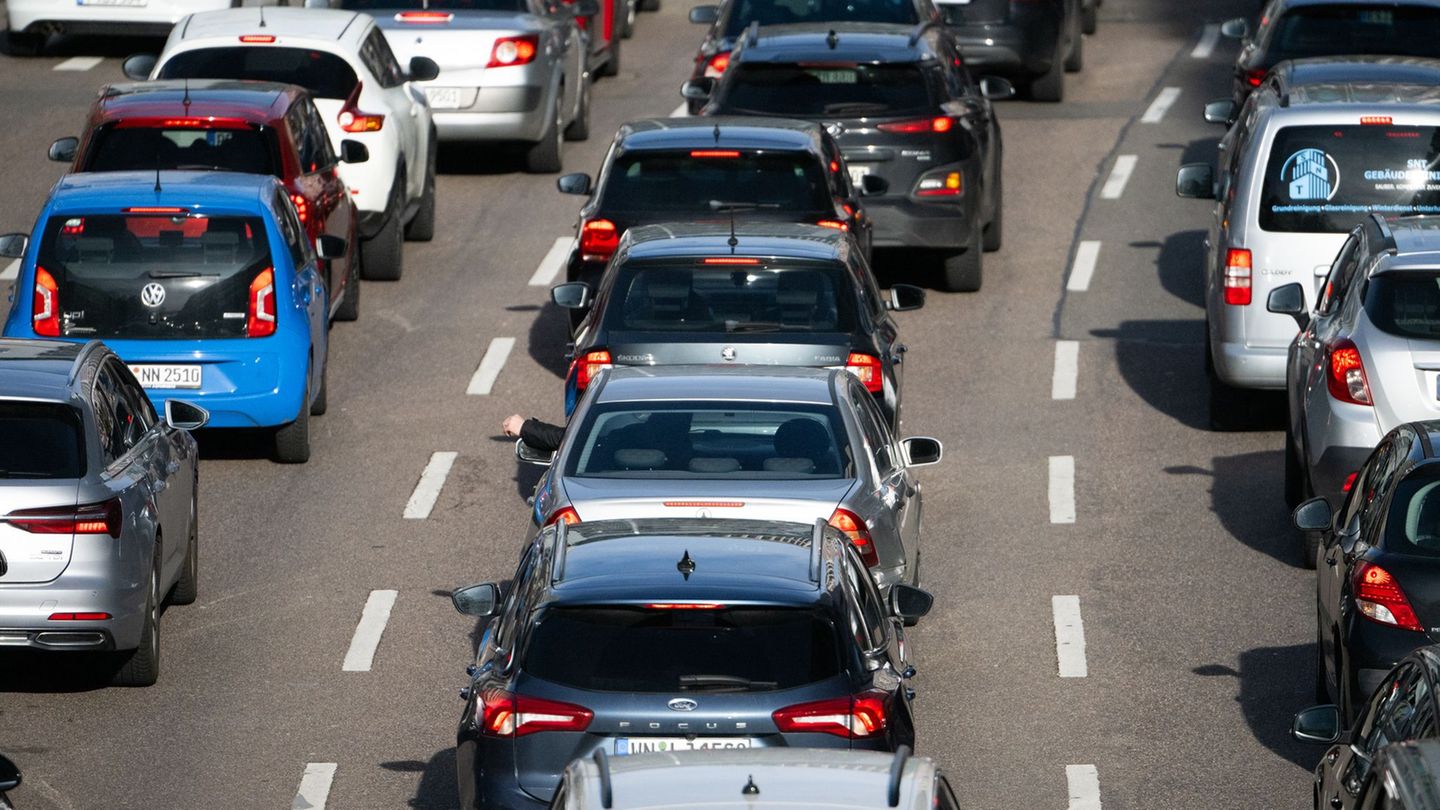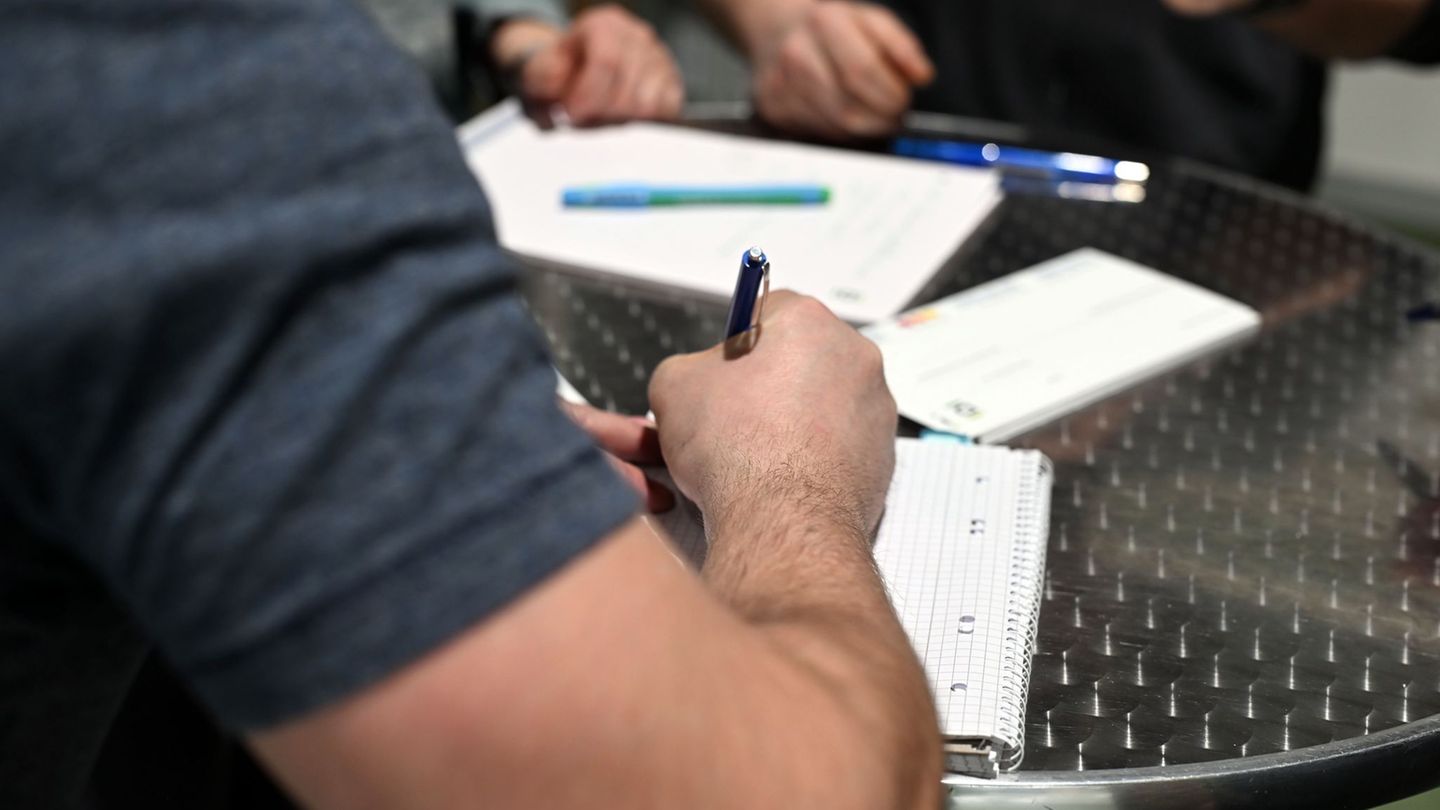Olaf Scholz traveled to Serbia at short notice to support a raw materials agreement with the EU. The trip revealed a dilemma for the Chancellor.
Two fighter jets accompany Olaf Scholz’s plane as it approaches Belgrade. At the airport, President Aleksandar Vučić himself stands next to the guard of honour before the Chancellor’s convoy drives past dozens of German and European flags into the city centre. There’s no doubt about it: a grand reception for the Chancellor. The Serbian President can do that.
It is rare for the Chancellor to change his travel plans relatively spontaneously because of a country with seven million inhabitants, especially when the ruler of this country is considered a difficult partner.
But that is exactly what Scholz did on Thursday evening. After the end of the summit of the European Political Community at Churchill’s Blenheim Palace, he travelled directly to Serbia – to see Vučić, even though he had just seen him at the British summit.
The relationship between the two countries is difficult. Vučić, whose country has been working towards EU accession prospects since 2014, meanders in his politics between rapprochement with the EU and flirtations with Russia and China. In domestic politics, the politician, who has been in power since 2014, first as prime minister and then as president, is acting increasingly authoritarian. There are regular accusations of corruption against him and his government. Under his leadership, the country recently slipped to 91st place in terms of press freedom.
Visit to Serbia: Germany needs lithium
So why is Scholz now honoring the Serb with a quick visit? The answer is simple: because the chemistry is right – literally. On Tuesday, after a long dispute and despite the protests of many environmentalists, the Serbian government cleared the way for lithium mining in the west of the country.
The chemical element is important for battery production. Batteries, in turn, are needed to build electric cars, around ten kilos per vehicle. Without more electric cars, the announced energy transition will hardly be possible.
Because there is only a small amount of lithium in Germany, the vast majority has to be imported. China is the main supplier, buying up lithium mines around the world. Experts assume that the People’s Republic could control around a third of the world’s lithium reserves by 2025.
Choosing the lesser evil
The Australian mining company Rio Tinto, however, has been awarded the contract for mining in Serbia. According to the company, around 58,000 tonnes of lithium could be extracted annually in western Serbia, which would cover around 17 percent of European demand. Three German companies – Mercedes, VW and Stellantis – are also involved.
That is why Scholz came to Belgrade to ennoble the conclusion of a lithium deal between Serbia and the EU with his presence.
This is a welcome upgrade for Vučić. He was recently isolated in Europe due to allegations of manipulation in the parliamentary elections in December 2023 and his pro-Russian course.
Best contacts with a brutal coup regime
For Scholz, the issue is a double-edged sword. He needs economic success and less dependence on China. And to achieve this, he is putting himself at the mercy of an unpredictable president who is constantly stirring up trouble in the region with his Kosovo policy. Scholz is confident that Germany is Serbia’s most important trading partner, much more important than Russia.
Such problematic deals are not new, but rather part of realpolitik. In the 1970s, both the Federal Republic and the GDR maintained excellent contacts with Chile, where the coup leader Augusto Pinochet brutally persecuted and murdered government critics at home, but opened the country up to economic cooperation in foreign policy.
The failed deal with Nordstream 2
An example from recent history is the refugee agreement between the EU and Turkey from 2016. At that time, the Europeans promised billions in aid to the Erdoğan regime, which in return promised to take back refugees from Greece. The EU stuck to the agreement even when the human rights situation in Turkey deteriorated massively just a few months later after a failed coup attempt against Erdoğan.
More than eight billion euros have so far flowed to Turkey as part of the deal. Opinions are divided as to whether it was successful.
The German-Russian gas pipeline project Nordstream 2, which the German government continued to operate despite Russia’s illegal annexation of Crimea, has clearly failed. At the beginning of his term in office, Scholz defended Nordstream 2 as a purely “economic project”. The suspension of the project at the start of the Ukraine war led to dramatic energy shortages in Germany.
The lithium deal with Serbia has several advantages for the EU and Germany. Not only does it reduce dependence on China for lithium imports, but the Australian operator also increases the chances that international environmental protection standards will be met when mining the light metal. Conversely, it contributes to stabilizing the Vučić government and gives the Serbian president more power.
“Of course it makes sense to secure access to important raw materials through strategic partnerships. However, hoping to achieve this security through a partnership with the Serbian government is risky,” says Matthias Ecker-Ehrhardt, Professor of International Relations at the University of Bamberg. Such a partnership would give the Serbian government “a strong trump card” that it could use at the next opportunity – for example, to emphasize Serbia’s rejection of a sovereign Kosovo, or to buy diplomatic leniency for supporting Serbian nationalists in Kosovo and Srpska.
According to Ecker-Ehrhardt, the German government and the European Commission should therefore make it absolutely clear where the “red lines” of this partnership lie: “Any destabilization of its neighbors must cost the Serbian government something and the sudden end of this partnership should also be named as a sure price.”
Source: Stern
I have been working in the news industry for over 6 years, first as a reporter and now as an editor. I have covered politics extensively, and my work has appeared in major newspapers and online news outlets around the world. In addition to my writing, I also contribute regularly to 24 Hours World.




